Philips investeert bijna 10 procent van de jaaromzet in Research & Development; in 2020 was dat 1,9 miljard euro. Daarvan gaat 40 procent, ruim 700 miljoen euro, naar Eindhoven, dat de belangrijkste en grootste innovatiehub van Philips wereldwijd is.
Het uitvinden van de wereld van morgen, daar werken de mensen bij Philips elke dag aan. In 2020 alleen al werden er 876 patentaanvragen ingediend, met een sterke focus op gezondheidstechnologie en -diensten.
Het baanbrekende werk van uitvinders bepaalt het succes van Philips in de toekomst. Maar wat zorgt er nu voor dat je succesvol bent in het op de markt brengen van innovaties die impact maken op de gezondheidszorg? “Er is geen opleiding tot uitvinder. Dat kun je alleen maar worden door ervaring op te doen en open te staan voor nieuwe dingen.”
Er is geen opleiding tot uitvinder. Dat kun je alleen maar worden door ervaring op te doen en open te staan voor nieuwe dingen.
Mark Johnson
Research Fellow
Mark Johnson kan het weten; als Research Fellow is hij binnen Philips niet alleen verantwoordelijk voor een recordaantal patenten, hij helpt collega-researchers dagelijks om de route te bewandelen van idee tot intellectual property – het aanvragen en vastleggen van intellectueel eigendom van een nieuwe uitvinding.
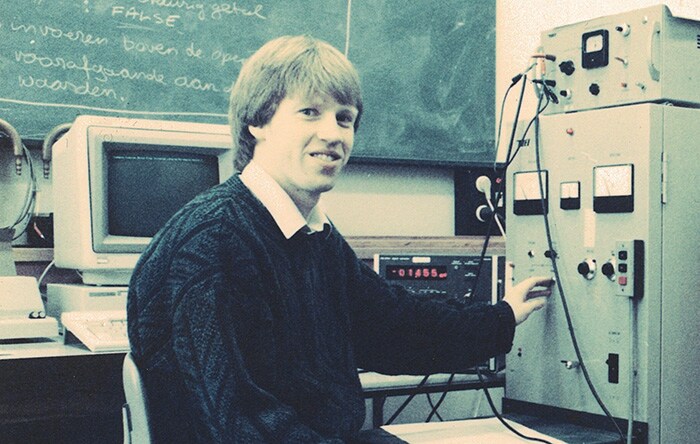
Mark Johnson in 1987
Hoe lang ben je al actief bij Philips?
“Zo’n 35 jaar geleden kwam ik hier binnen als natuurkundige. In de beginperiode heb ik onder meer gewerkt aan magnetische materialen die worden gebruikt om informatie op te slaan op videobanden. Begin jaren negentig heb ik nog het voorrecht gehad om nauw samen te werken met twee latere Nobelprijswinnaars, Peter Grunberg en Albert Fert.
Zij waren de uitvinder van de giant magnetoresistance (GMR), een basis sensortechnologie voor miniatuur hard drives van magnetisch materiaal, die uiteindelijk onder meer de iPod mogelijk hebben gemaakt. In 2007 ontvingen zij de Nobelprijs voor deze uitvinding.”
“Daarna ben ik terechtgekomen in een andere divisie van Philips, die zich bezighield met displays. Daar heb ik echt geleerd dat Philips top-uitvinders in huis heeft. Je moet je voorstellen; er zijn ongeveer twintig verschillende soorten schermen beschikbaar in de wereld, zoals LCD- en plasmaschermen. Eén researcher van Philips is verantwoordelijk geweest voor de uitvinding van drie van de twintig soorten displays die er zijn. Dat vond ik onvoorstelbaar, en eigenlijk nog steeds.”
“Je zou kunnen zeggen dat mijn fascinatie voor patenten toen begonnen is; ik ben in die tijd maximaal aan het uitvinden geslagen.”
Binnen Philips worden Invention Awards uitgereikt aan researchers die 10, 25, 50 of 100 patenten op hun naam hebben staan. Waar staat de teller op bij jou inmiddels?
“Dat vind ik moeilijk om te benoemen, want het is geen wedstrijd, maar ik kan wel zeggen dat het ver boven de vijfhonderd is. Wist je trouwens dat Thomas Edison, de uitvinder uit de negentiende eeuw, nog altijd in de top tien aller tijden staat het gaat om het aantal patenten? Hij had er 1.084. Maar wat voor hem gold is ook zeker waar voor mij; een patent behaal je bijna altijd met een team. Ik heb er misschien maar een paar waar alléén mijn naam op staat, en dat zijn zeker niet de beste.”
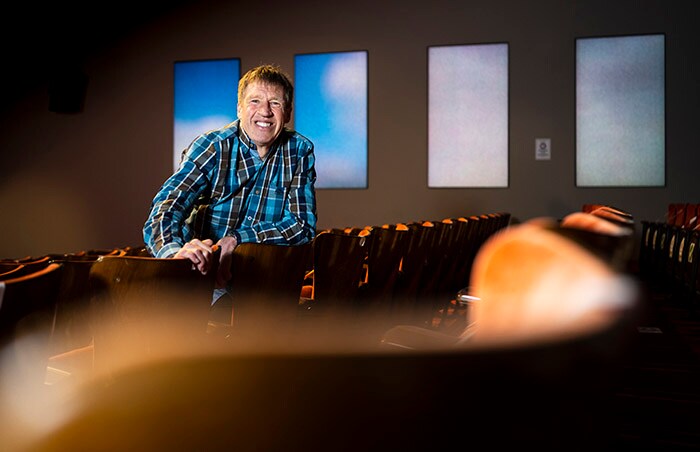
Philips is getransformeerd naar een gezondheidstechnologiebedrijf, hoe merk je dat in jouw onderzoek?
“Iets meer dan tien jaar geleden, toen Philips zich volledig ging richten op gezondheidstechnologie, ben ik me gaan bezighouden met onder meer de ontwikkeling van slimme apparaten en sensoren om vitale functies van patiënten te meten.
Het grootste verschil hierin is denk ik de verschuiving van hardware naar complexe systemen. Vroeger was het betrekkelijk overzichtelijk; we ontwikkelden een apparaat, dat werd gepatenteerd en daarna op de markt gebracht; een display, tandenborstel of MRI-systeem. Philips is altijd al goed geweest in het patenteren van een nieuw apparaat. En dat is belangrijk, want een patent is een onontkoombare stap als je een nieuw product succesvol op de markt wilt brengen.
Nu zie je dat de manier waarop we producten ontwikkelen sterk verandert; onze systemen worden steeds digitaler, waarbij het belangrijk is dat ze open staan voor andere systemen. Dat stelt andere eisen aan patenten. Ook ontwikkelen we niet meer alleen standaardoplossingen, maar we co-creëren die samen met de klant, om zo goed mogelijk tegemoet te komen aan de behoefte van die klant.”
We co-creëren die samen met de klant, om zo goed mogelijk tegemoet te komen aan de behoefte van die klant.
Mark Johnson
Research Fellow
Nu help je research-collega’s van over de hele wereld om patenten aan te vragen. Hoe is dat ooit begonnen?
“In vroeger tijden was het schrijven van een patentaanvraag eerlijk gezegd een beetje een ad hoc-proces; iedereen deed dat op zijn of haar eigen manier. We hebben toen consultants uitgenodigd om daar training in te krijgen. Toen kwamen we erachter dat we dat als team eigenlijk al beter onder de knie hadden dan die consultants, maar we moesten de manier waarop nog vastleggen in processen.”
“Dat hebben we vervolgens op papier gezet en nu werk ik met een team van over de hele wereld om collega’s wereldwijd te ondersteunen in het aanvragen van patenten.”
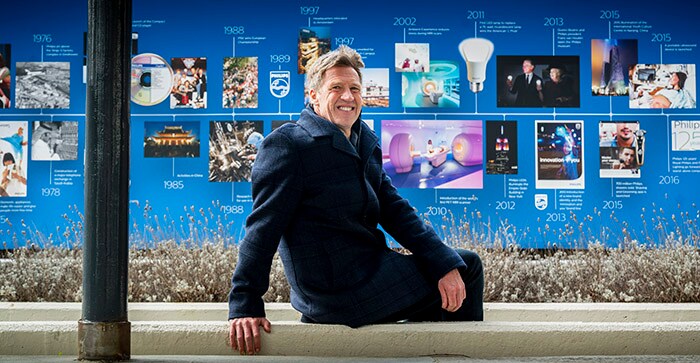
Waar zit volgens jou het geheim van de innovatiekracht van Philips?
“Aan de ene kant hebben we al heel lang ervaring met standaardisatie, en het belang daarvan binnen technologie kun je nauwelijks onderschatten. Of het nu ging om de ontwikkeling van cd’s, dvd’s of mpeg-bestanden; Philips heeft altijd al meegebouwd aan wereldwijde standaarden. Zeker nu technologische ecosystemen in de medische zorg steeds complexer worden, is standaardisatie ontzettend belangrijk, want het zorgt ervoor dat verschillende systemen naadloos op elkaar kunnen worden aangesloten.
Philips heeft altijd al meegebouwd aan wereldwijde standaarden.
Mark Johnson
Research Fellow
Hiervoor kunnen we als Philips experts vanuit verschillende disciplines laten aansluiten bij elk innovatietraject; of dat nu op medisch gebied is, zoals een huisarts, psycholoog of oncoloog, of op technologiegebied, zoals hardware en software experten, data scientists of AI-specialisten. Omdat we van alles in huis hebben, kunnen we innovatieve oplossingen maken voor echte problemen.
Tenslotte, en dat is denk ik het allerbelangrijkste: het zit in onze cultuur, van de laboratoria tot aan de top van de organisatie, om kennis te delen en zo samen te werken aan innovaties."
Het zit in onze cultuur, van de laboratoria tot aan de top van de organisatie, om kennis te delen en zo samen te werken aan innovaties.
Mark Johnson
Research Fellow
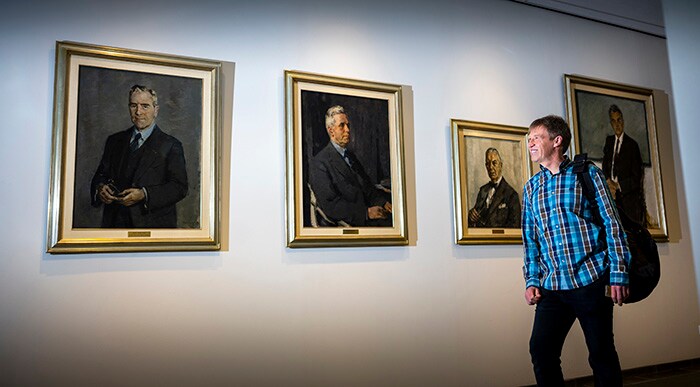
Welk advies zou je geven aan jonge collega’s die het ver willen schoppen in R&D?
“Maak gebruik van je opleiding, maar wees ook bereid om je te verbreden. Als je een mogelijkheid krijgt om je te verbreden, grijp die dan aan. Een open blik is het grootste geschenk dat je kunt krijgen als uitvinder. Zoek altijd naar kansen en niet naar problemen. Natuurlijk is er ook altijd een tijd om kritisch te zijn, maar meestal kun je beter opbouwend zijn, en positief meedenken.”
Binnen Philips werken duizenden uitvinders elke dag aan de technologieën van morgen. Wat zijn hun drijfveren? Hoe komen ze aan hun ideeën en hoe brengen ze die binnen Philips succesvol naar de markt? In de serie Impactful Inventors gaan we op zoek naar antwoorden op deze vragen.
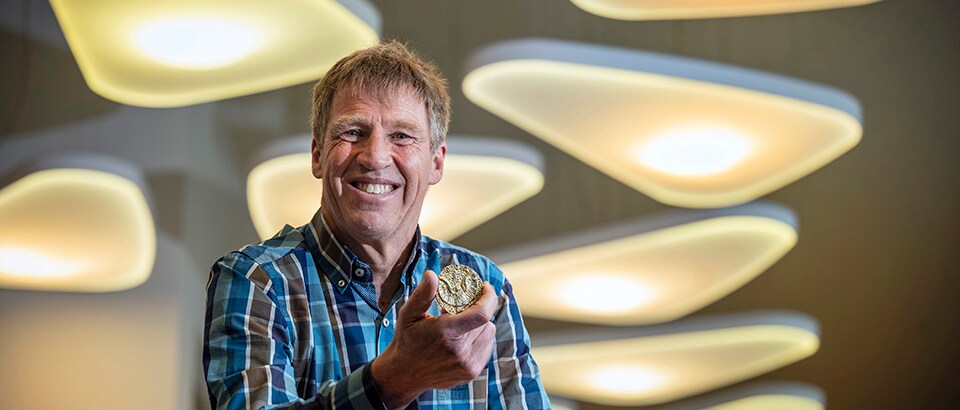
Mark Johnson, the man of hundreds of patents: "There is no training to become an inventor"
Philips invests nearly 10 percent of its annual revenue into Research & Development; in 2020, this amounted to 1.9 billion euros. Of this, 40 percent, roughly 700 million euros, goes to Eindhoven, which is the most important and largest innovation hub of Philips worldwide.
Inventing the world of tomorrow, that is what people at Philips work on every day. In 2020 alone, they filed 876 patent applications with a strong focus on health technology and services.
The ground-breaking work of inventors will determine Philips' future success. But how do you make sure that the innovations you bring to market successfully truly impact healthcare? “There is no training to become an inventor. You can only become one through experience and by being open to new ideas.”
There is no training to become an inventor. You can only become one through experience and by being open to new ideas.
Mark Johnson
Research Fellow
Mark Johnson should know; as a Research Fellow he is not only responsible for a record number of patents within Philips, but supports fellow researchers in following the path from idea to intellectual property on a daily basis.

Mark Johnson in 1987
How long have you been active at Philips?
“I came here as a physicist about 35 years ago. Initially, I worked on magnetic materials used to store information on video tapes, among other things. In the early 90s, I had the privilege of working closely with two later Nobel Prize winners, Peter Grunberg and Albert Fert.
They invented the giant magnetoresistance (GMR), a foundational sensor technology for miniature hard drives consisting of magnetic material, which eventually enabled the creation of devices like the iPod. In 2007, they received a Nobel Prize for this invention.”
“After that, I ended up in a different division within Philips, which dealt with displays. That is where I discovered Philips is home to some top-notch inventors. You have to imagine; there are about twenty different types of screens available in the world, such as LCD and plasma screens. One single Philips researcher invented three of the twenty types of displays available. I thought that was unimaginable, and actually I still do.”
“You could say that my fascination with patents started then; that is when I really started inventing.”
Within Philips, Invention Awards are given to researchers who were granted 10, 25, 50 or 100 patents. How many were you granted so far?
“I find that difficult to determine since it is not a competition, but I can say well over five hundred. By the way, did you know that Thomas Edison, the nineteenth century inventor, is still in the all-time top ten in terms of number of patents granted? He had 1,084 of them. However, what was true for him is certainly true for me; a patent is almost always filed and granted together with a team. I have a few that have only my name on them, and they are certainly not the best.”

Philips has transformed into a health technology company. How is that reflected in your research?
“Slightly over ten years ago, when Philips started to focus entirely on health technology, I began working on the development of smart devices and sensors to measure vital signs of patients, among other things.
I think the largest difference lies in the shift from hardware to complex systems. It used to be relatively clear; we developed a device that was patented and then marketed; a display, toothbrush or MRI system. Philips has always been good at patenting a new device, which is very important, because a patent is a necessity for successfully marketing a new product.
Today, the way we develop products is changing drastically; our systems are becoming increasingly digital, and it is important that they work with other systems as well. The demands for patents are changing. We no longer simply develop standard solutions, but we co-create them together with our customer to meet their needs as much as far as possible.”
We co-create these together with our customer to meet their needs as far as possible.
Mark Johnson
Research Fellow
Today, you are helping research colleagues from all over the world apply for patents. How did you start doing that?
“Before, applying for a patent was frankly a bit of an ad hoc process which everyone did in their own way. We then invited consultants to train ourselves. That is when we found out that, as a team, we already mastered the process better than the consultants did. However, we still had to record the way we apply for patents in a repeatable process. ”
"We recorded the process and now I work with a global team to support colleagues across the globe in applying for patents."

According to you, where lies the secret of Philips' innovative strength?
“On the one hand, we have a long history of standardization, and you can hardly underestimate the importance of this within technology. Whether it was the development of CDs, DVDs or MPEG files; Philips has always helped build global standards. Especially now that technological ecosystems in healthcare are becoming increasingly complex, standardization is extremely important, because it ensures that different systems can be seamlessly connected to each other.
Philips has always helped build global standards.
Mark Johnson
Research Fellow
To this end, as Philips, we can have experts from various disciplines join each innovation process; whether in the medical field, such as a general practitioner, psychologist or oncologist, or in the technology field, such as hardware and software experts, data scientists or AI specialists. Because we have so many disciplines within our company, we can create innovative solutions that help solve real problems.
Finally, and I think that is the most important thing: it is in our culture, from the laboratories all the way to the top of the organization, to share knowledge and thus collaborate on innovations."
It is in our culture, from the laboratories all the way to the top of the organization, to share knowledge and thus collaborate on innovations.
Mark Johnson
Research Fellow

What advice would you give to young colleagues who want to make it in R&D?
“Make use of your training, but be prepared to broaden your horizon as well. If you get an opportunity to do so, seize it. An open mind is the greatest gift you can get as an inventor. Always look for opportunities and not for problems. Of course there is always a time to be critical, but usually it is better to be more constructive and think along positively. ”
Within Philips, every day thousands of inventors work on tomorrow’s technologies. What drives them? How do they come up with their ideas and how do they successfully bring them to market? In the Impactful Inventors series, we will answer these questions.
Also read:
Henk van Houten, Chief Technology Officer: “Invention Awards winners are the heroes of Philips Research"












